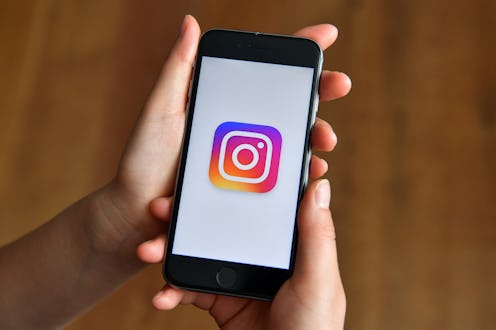
Advertisements for so-called "detox teas" — products that market themselves as weight-loss tools, but functionally work as laxatives — are all over social media. Detox tea ads on Instagram are promoted through celebrity pages and influencers alike. And these ads can have detrimental lasting effects on young people's self-esteem — just as detox tea's health effects can wreak havoc on users' digestive systems. Now, Instagram will restrict how these posts can be promoted, to avoid their showing up on the feeds of people younger than 18, Cosmopolitan UK reports.
The social media company is changing its policies so that posts aimed at promoting weight loss products and certain cosmetic procedures will not be visible to users under age 18, according to BuzzFeed news. And if a user believes that a post violates this new policy, they will be able to flag it so that Instagram can determine what action needs to be taken moving forward. The restrictions are geared toward protecting young people from misleading and even dangerous advertising about weight loss.
In the build-up to Instagram's decision, actors and models like Jameela Jamil and Felicity Hayward have been taking stands against Kim Kardashian's promotion of the brand Flat Tummy Co's supposedly appetite-suppressing lollipops and other products. Alleging that making these lollipops look sexy is in fact dangerous for young people, Hayward wrote in a May 2018 piece for Metro UK that "This product is endorsing eating disorders."
And Jamil, who is the founder of the body-positive I Weigh movement and helped Instagram create these policy changes, warned that these types of posts represent a "terrible and toxic influence on young girls." But finding this type of toxicity on social media, especially regarding body-shaming, is unfortunately not terribly uncommon, according to a 2017 study published in the journal Eating and Weight Disorders. The study found that more frequent involvement in Instagram's "healthy eating community" was linked to increased symptoms in people with orthorexia nervosa, which is an "obsession with eating healthily."
But according to a 2017 study published in the journal Body Image, young girls are quite resilient in the face of social media pressure about their bodies. The study found that adolescent girls were more likely to compare themselves negatively with peers than to celebrities, and that their school and parenting environments were able to positively mitigate any negative influences from social media. However, the study did not refute the fact that platforms like Instagram can pose significant risks to young people's body image.
And this is especially important in light of a 2019 study published in the journal Current Obesity Reports, which concluded that social media mostly serves as a detriment to women's body image. And the effects of body shaming promoted by the diet and weight loss industry impacts people of all genders. According to a 2018 study published in the journal Cyberpsychology, Behavior, and Social Networking, queer men's body image and mental health also suffers in relation to their social media use.
So as you're scrolling, know that with Instagram's new guidelines, any posts that offer to sell "detox" products now violate the platform's policies. You can now hit the "report" button with confidence that your complaint is, indeed, something that will be heard.